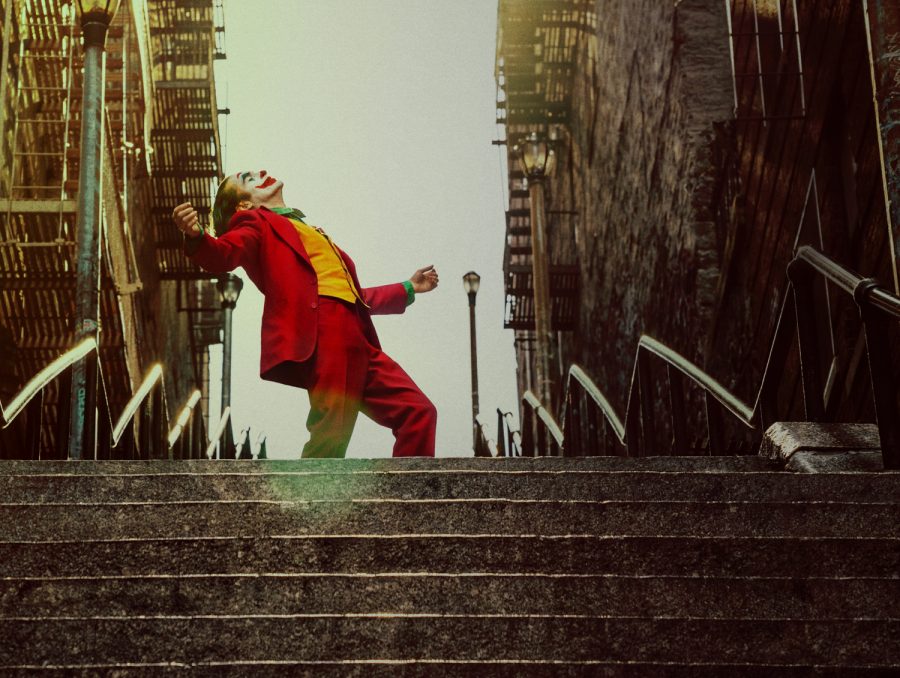‘Joker’: Don’t believe the hype
October 5, 2019
“Joker” arrived in theaters as one of the most anticipated films of 2019, but its abundant faults and poorly planned concept cause it to be the first big disappointment of the fall movie season.
Director Todd Phillips (“The Hangover” trilogy, “Road Trip”) branches into the ever-expanding world of superhero movies with his take on the genre, which is practically aimed to be the antithesis to Marvel movies.
The lighthearted spandex-covered heroes are replaced with a grimy world that follows Arthur Fleck (Joaquin Phoenix), a mentally-ill man who lives with his mother, as he slips into the persona of Joker and becomes a violent revolutionary figure in Gotham.
Phoenix gives an incredible, fully-committed performance, as he does in every movie. He’s perfected Joker’s laugh and awkward mannerisms, but it makes his presence feel all the more wasted, as it’s hard not to think about his level of talent being in a movie that actually has something to say.
The effort Phoenix puts in does not match the half-baked ideas the movie presents, which is simply a pessimistic tale about isolation leading to hatred. This can be said about almost all of the performances in “Joker”, as the acting in this film is a ray of light surrounded by the cheap sparklers that are the misguided direction and flimsy script.
“Joker” nearly bends over backwards at times to make the audience feel sympathy for a man who spirals into becoming a domestic terrorist, and from the beginning the reasons for his descent are shown with a gravely serious, mostly nonsensical approach.
The opening scene finds Arthur sign spinning for a going-out-of-business sale, only for a group of teenagers to steal his sign and jump him (not for money, just for fun), which leads to him acquiring a gun and sets him on his violent path.
Phillips desperately searches for reasons and excuses for Arthur to become more vicious and he demonstrates them in a purely elementary way, like a man running for mayor punching Arthur in the mouth at a political fundraiser because he continuously asked the candidate if he was Arthur’s father, Arthur getting made fun of on a late-night talk show, etc.
It’s a crutch for his violence to be seen as passable, but if he was killing at random then it wouldn’t make the film any better, showing why the very existence of the movie makes its story virtually impossible to effectively be told.
There are sometimes interesting narrative decisions, such as Arthur’s delusions which make the audience question if what they’re seeing is real, but this is more of a distraction from the flaws than a redeeming quality.
Phillips alternates pinning the blame on Arthur and the society around him in a feeble attempt to say everyone is responsible for the ensuing madness, while also partially trying to mirror today’s socio-political climate. Any amount of nuance is thrown out the window, though, as the only explanations given for Gotham’s unrest are trash is overflowing the streets and there is a large wealth gap.
If Phillips was interested in sharing the story of a broken man then some amount of intricacy in the pain people feel would’ve provided some depth to the underlying anger laced throughout the movie, but instead the audiences gets an answer no more profound than “people are mad because things are bad.”
If “Joker” was instead called “Arthur” then the hype around the film would have been nearly nonexistent. It represents the overall problem with the landscape of today’s movies, as some type of brand or franchise has to be attached to a film to sell tickets, and it has now gotten to the point where the origin story of a psychopath who wears clown makeup can masquerade as a “deep” character study.
Grade: “C-”
Opinion editor Cameron Coyle can be reached at [email protected].
























